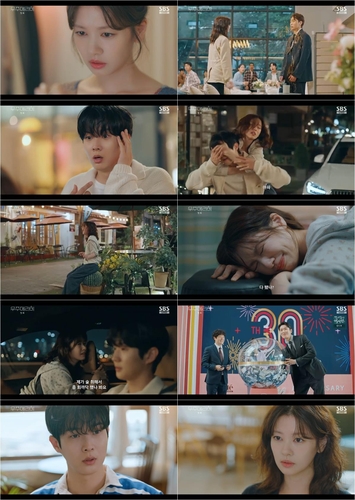The leads, Choi Woo‑sik and Jung So‑min, turn a fake marriage and a prize newlywed home into a playful setup.
The premiere logged an early nationwide rating in the low 5% range (Nielsen Korea), a steady start for the rom‑com genre.
However, familiar clichés and questions about realism have already sparked discussion.
“A fake marriage that sparks real feelings — asking whether to laugh or to worry”
Overview
The premise is straightforward."Wooju Merimi" is a Fri–Sat romantic comedy that began airing on SBS on October 10, 2025. SBS is one of South Korea's main broadcasters, and the show follows the familiar 9:50 p.m. slot for weekend dramas (KST).
Choi Woo‑sik and Jung So‑min lead a story about a staged marriage entered into so the couple can claim a high‑end newlywed apartment that is being offered as a prize. The series is planned for 12 episodes plus a special. Production companies include Samhwa Networks and Studio S, and the directing and writing teams aim to manage the rhythm typical of the rom‑com genre.
Background and context
This is not just a gimmick.The fake‑marriage setup is a well‑worn device in Korean TV. However, this series uses it to explore housing pressures and what romance and marriage mean today. The prize newlywed home is not a throwaway prop. Instead, it acts as a financial and social force that pushes character choices.
Therefore, the show tries to mix light comedy with recognizable worries about family life, housing, and real estate—turning social concerns into comedic material.
"Comedy changes how audiences relate to the real choices that surround marriage."
Narrative development and characters
The tone set in episode one matters.Mary (Jung So‑min) arrives hurt after an engagement ends because of infidelity. Wooju (Choi Woo‑sik) accidentally wins the right to claim a newlywed apartment as a prize. The two are not legally married, but they choose a sham marriage to qualify for the prize. Along the way, family members, friends, and people tied to the giveaway create pressure and conflict that drive the plot.
Human reactions—from relatives to public scrutiny—form the drama's main friction.

Pros — the strengths of a fake‑marriage rom‑com
Humor is powerful.From a rom‑com perspective, "Wooju Merimi" follows genre conventions while offering comfort. First, the leads' chemistry drives the show. Choi and Jung portray characters with different wounds and lacks, and their lines and expressions generate relatable moments.
Second, the fake marriage functions as an accepted fantasy. Audiences can experience heavy subjects—marriage, home, commitment—without facing them directly.
Also, the series uses housing as raw material for comedy. The apartment becomes more than a setting; it stands in for stability. As a result, characters' choices connect with viewers' real housing anxieties.
In this way, real‑estate and home ownership become narrative fuel woven into the rom‑com fabric.
Ultimately, viewers can reassess the value of family and relationships while laughing.
Cons — realism concerns and cliché limits
Those criticisms carry weight.Critics point to several structural problems. First, the fake‑marriage premise can feel detached from reality. Legal steps and social constraints make a quick sham marriage to claim a prize less believable. On the other hand, viewers often suspend disbelief for romance, but the show must still earn that trust.
Second, repeated rom‑com clichés can weaken the series. Elements like prize apartments, infidelity, and manufactured misunderstandings are familiar. That familiarity can comfort viewers but also drain freshness.
If character depth is thin, audience engagement will fall. If Mary and Wooju's inner struggles are handled superficially, empathy erodes. Consequently, the series risks leaving only routine laughs while its intended message fades.
Finally, ratings are an external barometer. A 5% debut is encouraging, yet if pacing stalls, viewership could decline.
"Romance fades when novelty fades."
Comparisons and genre tradition
Comparison helps clarify risks and promise.Past Korean rom‑coms often start with a contrived arrangement and later anchor it in emotional truth. Some hit that balance and become hits. Others rely too much on the setup and lose momentum midseason.
So the key question for "Wooju Merimi" is how carefully it develops inner motivations and surrounding conflicts.
Meanwhile, simultaneous release on global platforms expands reach. If the series appears on services like Netflix or Viki, international reactions will add another evaluation layer. However, broadcast viewers and OTT audiences sometimes prefer different tempos, so producers must try to satisfy both.
Production choices and industry meaning
Production decisions shape the result.The collaboration between Samhwa Networks and Studio S offers a stable production base, but creative risk-taking matters too. Choosing housing and real‑estate as core themes signals an attempt to tie genre entertainment to social conversation. This approach aims to reach beyond pure diversion to touch everyday life.
Audience reaction and what to watch next
Viewer perception will decide much.Online responses balance praise and reservation: many call it "comfortably familiar," while others ask for more originality. This split suggests the show follows genre rules but needs distinguishing elements.
Key things to watch are how characters grow and how conflicts resolve. If the production digs into emotional truth, clichés can feel refreshed.
In short: empathy is the deciding factor. When empathy deepens, comedy gains meaning and even worn tropes can spark new feeling.
Conversely, if only laughs remain, the drama risks being a short‑lived trend.

Conclusion
The core point is clear."Wooju Merimi" follows rom‑com conventions while tying in housing and family issues to gain empathy. The first episode's rating is a decent start, and the leads' chemistry plus brisk pacing are assets.
However, repetitive clichés and realism gaps remain variables that will shape later judgment.
To summarize, the show offers both laughs and questions. If later episodes reveal authentic character truth, viewer assessments could shift positively.
What kind of plot turns would you want to see for a fake‑marriage romance to feel genuinely truthful?